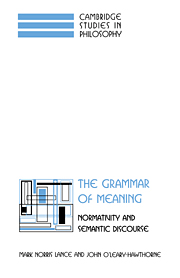Book contents
- Frontmatter
- Contents
- Acknowledgments
- Introduction
- PART I THE PLACE OF MEANING TALK IN SOCIO-LINGUISTIC PRACTICE
- 1 The ends and means of translation: critical reflections on Quine's indeterminacy of translation thesis
- 2 Synonymy, analyticity, and a priori authority
- 3 Where do we go from here?: a pragmatist account of normative judgment
- PART II NATURALISM AND MEANING TALK
- Bibliography
- Index
2 - Synonymy, analyticity, and a priori authority
Published online by Cambridge University Press: 05 December 2011
- Frontmatter
- Contents
- Acknowledgments
- Introduction
- PART I THE PLACE OF MEANING TALK IN SOCIO-LINGUISTIC PRACTICE
- 1 The ends and means of translation: critical reflections on Quine's indeterminacy of translation thesis
- 2 Synonymy, analyticity, and a priori authority
- 3 Where do we go from here?: a pragmatist account of normative judgment
- PART II NATURALISM AND MEANING TALK
- Bibliography
- Index
Summary
But if someone were to say “so logic too is an empirical science” he would be wrong. Yet this is right: the same proposition may get treated at one time as something to test by experience, at another as a rule of testing.
Wittgenstein, On Certainty, no. 98What then of the doctrinal side, the justification of our knowledge of truths about nature? … On the doctrinal side, I do not see that we are farther along today than where Hume left us. The Humean predicament is the human predicament.
W. V. O. Quine, “Epistemology Naturalized,” p. 72One way of approaching linguistic meaning is to think about translation claims between languages – interlinguistic semantic claims. Another approach focuses more directly on meaning claims concerning words or sentences within a language, on intralinguistic semantic claims. It is when focusing on intralinguistic issues that analyticity intuitions find their clearest voice; indeed, one cannot get very far at all in thinking about intralinguistic meaning claims without confronting difficult issues about analyticity. In this chapter we present our own account of the analytic/synthetic distinction. Though we accept much of Quine's negative appraisal, the analytic/synthetic distinction does have a useful place, we argue, in socio-linguistic practice; what needs to be resisted is certain philosophical – more specifically, epistemological – uses of that distinction.
Quine's polemic against synonymy and the analytic/synthetic distinction has many facets.
- Type
- Chapter
- Information
- The Grammar of MeaningNormativity and Semantic Discourse, pp. 83 - 171Publisher: Cambridge University PressPrint publication year: 1997



